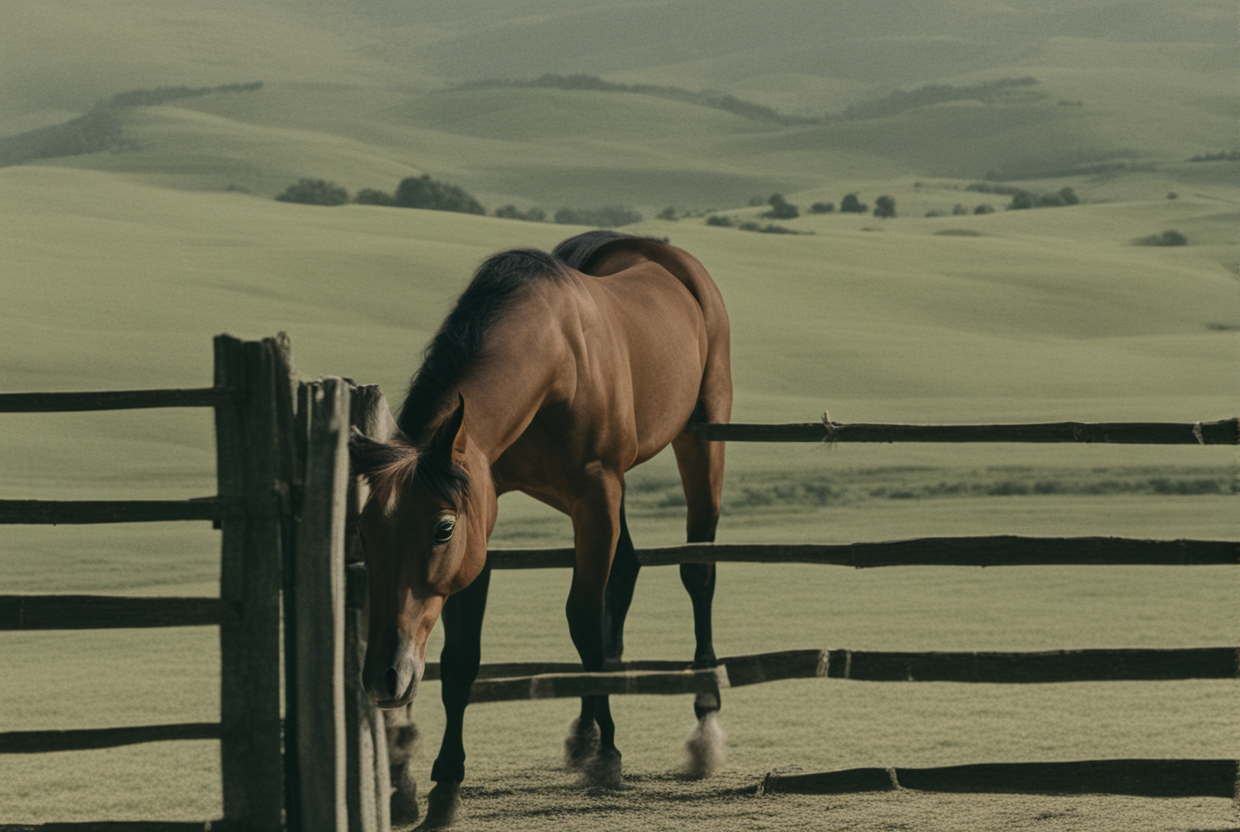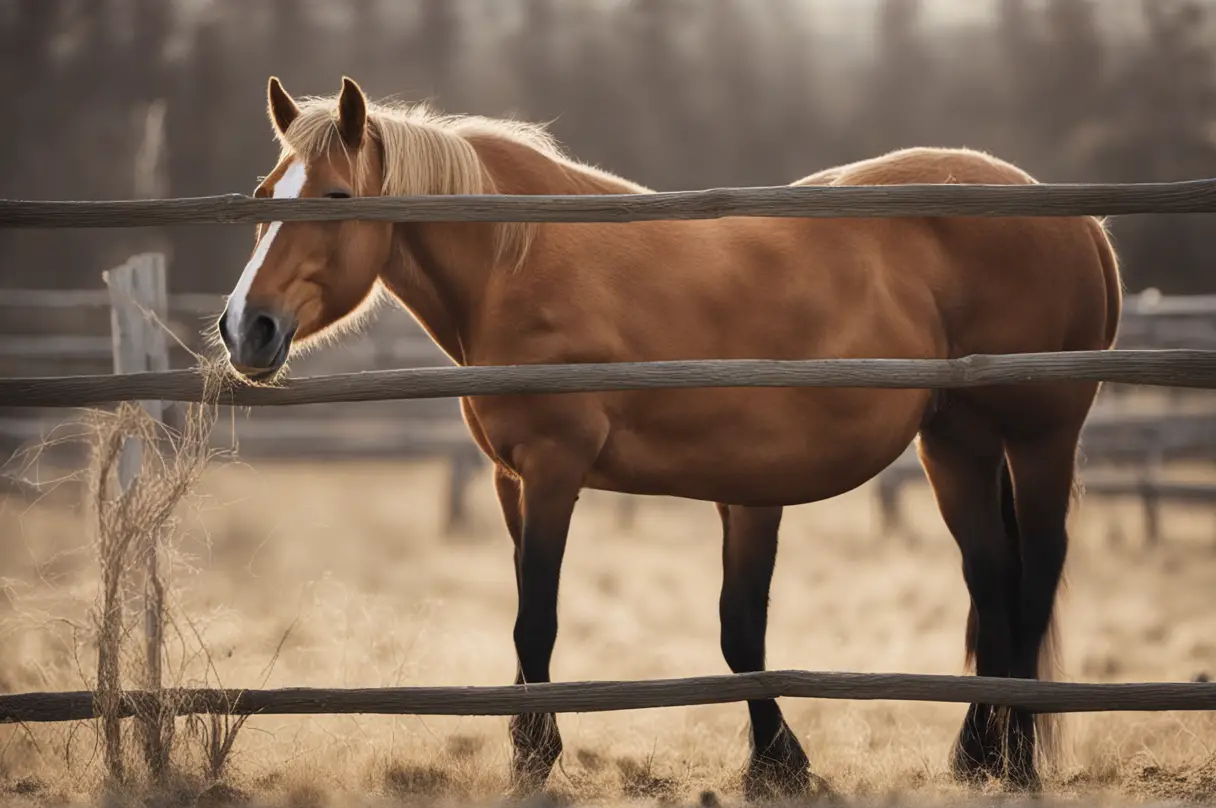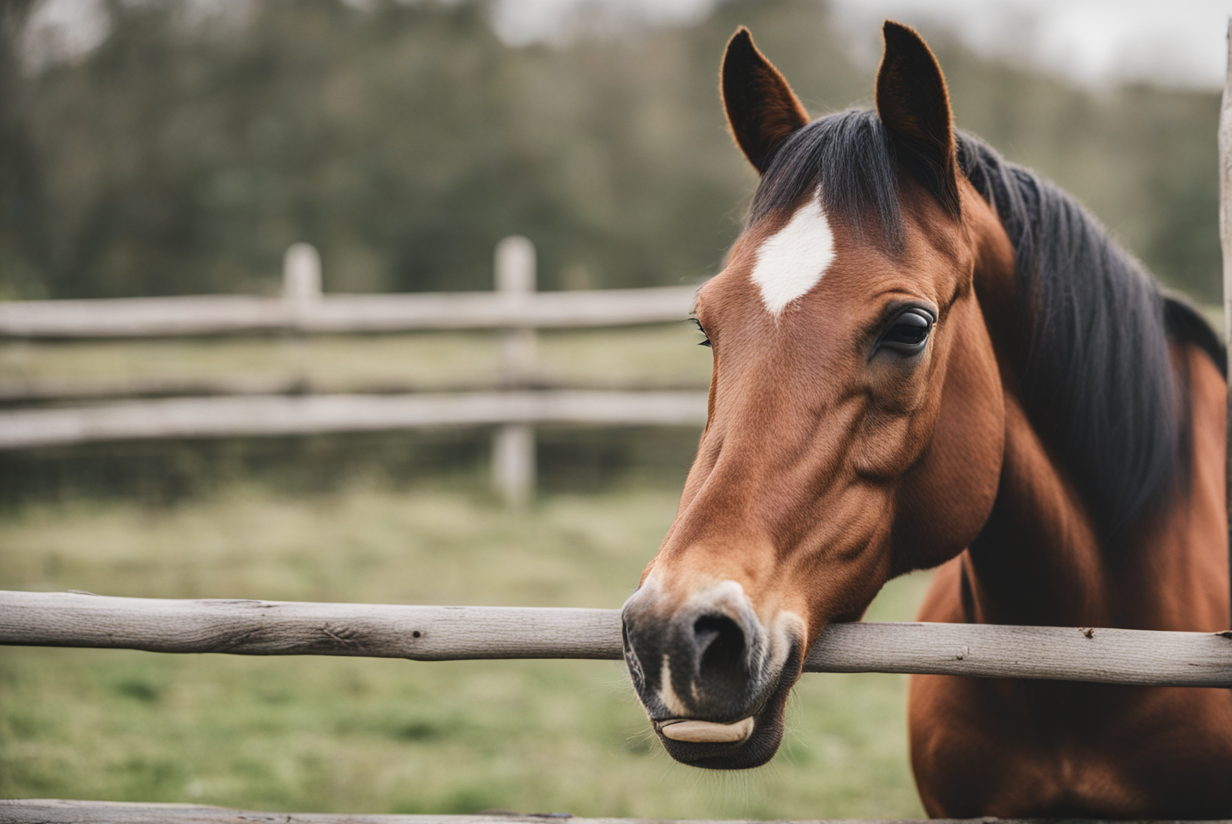Today I want to tackle a common question I get from fellow horse owners – why do horses chew fences?
As a lifelong horse lover and owner of several horses myself, I’ve seen this behavior more times than I can count.
And let me tell you, it used to drive me crazy!
I’d spend hours meticulously installing new fencing, only to come back the next day to find bite marks and slobber all over my hard work.
I tried everything – spraying bitter apple spray, putting up electric fencing, you name it.
But those rascally horses just kept on chewing.
So why do they do it?
Well, after years of pulling my hair out and researching solutions, I finally got to the bottom of it.
Turns out, there are a few key reasons horses chew fences:
Table of Contents
Boredom
One of the most common reasons is simply boredom. Horses are highly intelligent, active animals that need mental stimulation.
If they don’t have enough enrichment in their daily routines, they’ll start seeking it out in other ways – like chewing fences.

I noticed this was especially true with my horses on days when they didn’t get turned out or didn’t have toys to play with in their stalls.
For example, my horse Reno would always chew his stall door right after breakfast on days when it was too icy to go outside.
He’d gobble up his grain and then immediately turn his attention to gnawing on the wooden door frame. I could tell he was bored being stuck inside with nothing to do.
Once I started giving him interactive toys like treat balls or lickable blocks after meals, the chewing decreased dramatically.
My old mare Willow was also a chronic fence chewer on lazy summer afternoons when the horses were just hanging out in the pasture.
You could tell she got bored of grazing all day and needed more mental stimulation.
I installed some equine playground equipment like hanging balls and poles to bat around which helped occupy her.
The key is providing enough variety and enrichment in their environment to prevent boredom in the first place.
Stress Relief
Chewing can also be a self-soothing behavior for stressed horses.
Just like we humans might bite our nails or chew gum when we’re anxious, horses feel better when they grind their teeth on something.

Fences, unfortunately, make for convenient chew toys when they’re feeling on edge.
I first noticed this with my anxious mare Daisy whenever there were changes to her routine.
For instance, if we had a farrier appointment or I rearranged the horses in the pasture, she would start obsessively chewing the fence rails.
It took me a while to make the connection that she was using it as a coping mechanism for stress.
Once I made an effort to keep her routine consistent and worked on desensitizing her to changes, the fence chewing decreased.
My young gelding Chili also went through a phase of fence chewing when we first introduced him to the herd.
He was low on the totem pole and got bullied by the older mares. I could see him anxiously gnawing the fences after being run off from hay piles or chased out of the shelter.
Providing multiple hay stations and shelters helped reduce competition and his stress levels. He stopped using the fence as a stress reliever once he established his place in the herd.
To Grab Your Attention
Smart horses learn that fence-chewing gets a reaction from their humans. Even if it’s negative attention, they’ll take what they can get! This is especially true for social horses looking for interaction.

One of my geldings loved to wait until I was in view to start really going at the fence just to get me to come hang out with him.
My attention-seeking pony Minty was the worst for this. Whenever he saw me doing chores, he’d walk over to the fence, stare right at me, and start gnawing on the wood rails. If I ignored him, he’d start chewing even harder while whinnying for me.
He learned that fence chewing was a sure way to get me to drop what I was doing and come give him treats and scratches.
While cute, I didn’t want him destroying the fences, so I made sure to build in dedicated one-on-one time for the attention hogs like him.
Some horses also chew fences out of boredom when turned out by themselves. My older gelding hated being alone in the pasture with no buddies to interact with. He’d call and pace the fences when by himself.
I solved this by getting him a goat companion that kept him entertained so he no longer felt the need to chew fences to pass the time or get my attention.
Health Issues
In some cases, underlying dental or digestive issues can cause fence chewing as well.
Discomfort in their mouths or stomachs can make horses seek out chewing and grinding behavior for relief. It’s important to rule these problems out with your vet.
I had a pony who chronically chewed his stall door despite having toys and turnout time. A vet exam revealed that his back molars were overgrown and he likely had tooth pain.
After having his teeth floated, the excessive chewing stopped. Make sure your horses get their teeth checked annually to prevent dental discomfort that leads to chewing behaviors.
My older mare also started chewing fences more as she developed gastric ulcers. The vet said her stomach discomfort caused her to crave the saliva production and soothing feeling she got from chewing.
After treating her ulcers, addressing her diet, and reducing stress, the fence chewing significantly decreased as her gut felt better.
Sometimes fence chewing is the first clue there’s an underlying health issue, so it’s worth having your vet investigate if it becomes excessive.
Tips to Stop Fence Chewing
Now that you know some of the reasons behind this pesky behavior, here are my top tips to curb fence chewing:
- Make sure horses get adequate turnout time and physical activity daily to prevent boredom.
- Provide enrichment with toys, treat balls, lickable blocks to stimulate their mind when confined.
- Address any underlying stress factors like herd dynamics or environmental discomfort.
- Rule out dental, gastric, or other health issues with your vet.
- Try deterrent sprays, electric fencing, or protective fencing covers.
- Reward horses with attention, praise, or treats when they’re not chewing.
- Make time for individual attention with the social butterflies.
- Provide companion animals for horses turned out alone.
With some patience and creativity, you can break the fence chewing habit! I know it took me a few tries to get it right with my crew.
But it’s worth it not to have to constantly repair damaged fences. Let me know if you have any other tips for stopping fence chewers. I’m always open to new ideas!
Use Bitter Sprays
Spraying bitter-tasting substances directly onto fences can help curb chewing. The awful taste deters horses from gnawing on the areas you spray.
I’ve had the most success with bitter apple sprays, but you can also find commercial anti-chew sprays made specifically for horses.
Apply them liberally along the top and sides of fence boards in areas your horses chew.
Reapply frequently, as the effects wear off over time, especially with rain. It usually takes a week or two for horses to learn to avoid the nasty taste.
Don’t just spray once and expect permanent results. Be diligent with reapplying a bitter deterrent 2-3 times a week to condition horses to stop seeing fences as chew toys.
Use Protective Fencing Covers
If you have a dedicated fence chewer, consider using metal or plastic covers to protect sections prone to chewing.
The covers act as a physical barrier so the horses can’t access and bite the wood. I’ve used basic metal flashing and connectors to cover fence boards in high traffic areas. Try small sections first to see if horses redirect and chew elsewhere.
For my wood-lover Minty, I ultimately had to cover the bottom 3 feet of fencing around his stall and paddock to deter him.
It was an investment, but saved so much time and money compared to replacing chewed fences every month. Protective covers also come in plastic and polyethylene materials. Just be sure to secure them well so they can’t be pulled off and chewed.
Provide Chew Toys
Giving horses appropriate chew items can help redirect the urge to gnaw on fences. Try safe chew toys like oversized dog bones, knotted rope toys, or durable balls.
Edible options include hay-stuffed balls, gummy treats, and logs. I hang tripe balls, apple branches, and seaweed snacks in my horses’ stalls for enrichment. The key is providing various textures and flavors to appeal to their chewing instincts.
Rotate new toys frequently to prevent boredom. Having a generous supply spread around their living space gives fence chewers something acceptable to gnaw and play with instead. Just make sure all chewing toys are big enough not to pose a choking hazard.
Use Electric Fencing
Electric fencing can be a powerful deterrent, since horses learn to avoid the unpleasant shock. Effective for chronic fence chewers, you can add a single electric line or tape along the top or bottom of fences.
Use polytape for visibility and set the charger low enough that it startles horses without hurting them. The zap trains them to keep away from fences altogether.
I strung up electrified tape along my back pasture fence after the herd had destroyed part of it chewing.
It only took a week before no one would go near the fence! Just make sure your fences are already sturdy, as electric lines don’t provide physical strength. And don’t use it with foals and minimally with stallions. Though effective, electric fencing takes expertise to install safely.
Provide Plenty of Hay
Having ample forage available reduces boredom and the urge to chew fences. Scatter hay generously around pastures and pad stalls deeply to satisfy your horses’ natural urge to graze and chew.
You can use slow feeder nets or wagons to make hay last longer while preventing waste. My pony stopped destroying fences as much when I started really loading his stall with hay to nibble on all day and night.
I also set up multiple hay stations in the pasture instead of one pile. Ensuring horses always have hay to munch often reduces their fixation on fences.
Just don’t go overboard, as excess calories can cause obesity and other issues. Customize free-choice forage based on each horse’s metabolism and needs.